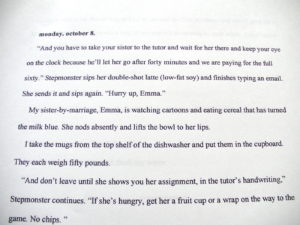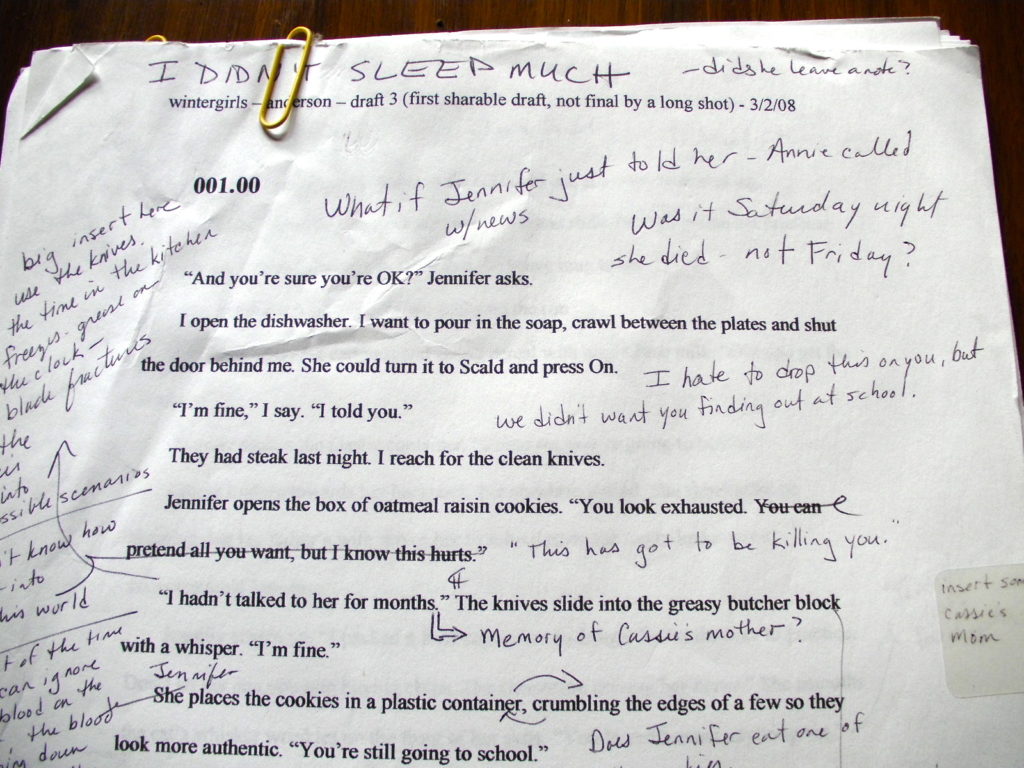Let me expand on yesterday’s remarks about the suckitude that often pours onto the page in the early stage of a writing project.
I’m going to use the writing of WINTERGIRLS as an example.
When I was first fumbling around with the first draft, I knew that I wanted to write about what it feels like to be trapped in an eating disorder. That was all I knew. I did a lot of free writing – letting words trickle down my arm and drip on the page. This is one of the first things I wrote, exactly as I wrote it:
“One graham cracker, broken into four pieces.
Sixteen grams of dry, yellow cheese.
Seven grapes.
Peeled.”
What did that mean? I had no idea. I was at the Suckitude PLUS Confusion stage of First Draft Writing. Earlier in my writing career, I would have obsessed about those four lines and tried to squeeze them into dialog or develop a scene around them, or waste several hours rearranging them on the page like Christmas decorations on a tree.
But it was an ever-so-slightly wiser me who wrote those four lines. They felt like they were getting closer to the voice of the main character, but I knew that I wasn’t there yet. I kept writing. And then this popped out of my brain:
“They say, “Eat this Camille. Eat this please eat please just this please little bit.”
“Please.”
They are vultures stalking me, wings folded neatly behind them, pink throats studded with white hairs like porcupine quills, thick beaks built for tearing flesh.
They want to snatch a bite – from my calf, maybe, or the inside of my arm – tug the meat from the bone, rip it free and fly away with their treasure.
It is very hard to kill a vulture.”
Except for the fact that I still hadn’t nailed down the name of the main character, and that the last line was unnecessary chicken poo, this felt better. But there was a problem: I had absolutely no idea what it meant or what the heck was going on with the character as she whispered those words to me.
I was confused. And quite sure (again) that I couldn’t write my way out of a wet paper bag. But I kept scribbling. A lot of what I wrote was awful and every once in a while a few lines would appear that felt real. Eventually, I had a bunch of pages that I called the first draft. Here is Page One:
Meh. Underwhelming, tho’ it has many of the elements that made it in the final book. I kept muttering to myself and writing. The second draft wasn’t much better than the first. But the third draft had some life in, enough so that when I reread it from start to finish, I could finally see the direction the story wanted to go. I scribbled all over that draft. See?
A lot of this material wound up moving to the second page in the final draft, but it was at this point – months and months after I started work on the project, that I finally felt like I knew what I was doing. Those lines about the graham cracker and dry cheese were thrown out. The section about being surrounded by stalking birds, hungry to eat her (I changed them from vultures to crows) wound up belonging on pages 264-265 in the final book – about 10 pages from the end of the story.
My point is this: judging your work early in the process or being afraid to write or quitting because you know what you’ve written is chicken poo, or you have no idea what any of it means is ridiculous. Part of the fun of writing is figuring out what it means. It is exciting and gratifying to revise chicken poo into strong storytelling.
Ready…
Pablo Picasso said “Art washes away from the soul the dust of everyday life.”
Set…
Turn off your phone and television.
Today’s prompt:
Choose one of Picasso’s images to study. Write about the person that he painted in the image. Don’t try to make sense of what you write. Just listen to the still, small voice inside. Go weird, dear friends. Venture outside your comfort zone.
Scribble…. Scribble…. Scribble!!


